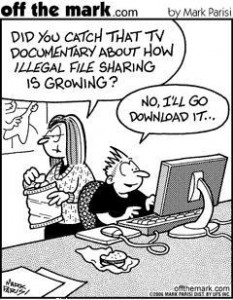The Good Side of Illegal File-Sharing and Online Piracy
Recently, GamePro magazine ran a feature article detailing the negative financial impact internet piracy has caused to the tech industry. The article cited some pretty disturbing figures, such as over $3 billion in lost annual profits for the video game industry alone. Note that if you haven’t heard of GamePro, then you likely spent the majority of your adolescent years not stuffed in a locker.
Back to the point at hand, file-sharing has gotten an incredibly bad rap since its popularization by way of Napster in 1999. Though ever since the inception of internet, people have always been able to both upload and download files online, Napster brought a new streamlined way for users to exchange files through a searchable dedicated file sharing network. It brought the phrase peer-to-peer file sharing (P2P) into the American lexicon.
Since that time, Napster was sued, shutdown, and eventually relaunched as a failed pay-to-download music service. But from Napster arose numerous P2P copycats, all of which were eventually trumped by faster and more efficient file sharing methods, such as BitTorrent and the rise of video-sharing websites. There’s no doubt that illegal file-sharing can be both a financial and creative detriment to virtually every subset of the entertainment industry – from books to movies to video games. However, file-sharing itself is not necessarily the demonic entity that the media and the Recording Industry Association of America make it out to be. In fact, in some cases, file-sharing can be downright beneficial to those whose intellectual property is being shared without permission.
 What group of people can benefit from such “illegal” file-sharing? It’s not a small subcategory of artists. In fact, the people who benefit most from unauthorized file-sharing is any non-mainstream creator of music, movies, art, literature, video games, and pretty much any other creative medium out there. By non-mainstream, I’m referring to those whose work is not commercially distributed or sold to the American public on a large national scale.
What group of people can benefit from such “illegal” file-sharing? It’s not a small subcategory of artists. In fact, the people who benefit most from unauthorized file-sharing is any non-mainstream creator of music, movies, art, literature, video games, and pretty much any other creative medium out there. By non-mainstream, I’m referring to those whose work is not commercially distributed or sold to the American public on a large national scale.
This statement may sound counterintuitive, since illegal downloaders get the benefit of an artist’s work without ever paying the creator for it. Though this is true, for indie artists, the few bucks lost through illegal downloads is negligible compared to the potential opportunities and mass public exposure that the artist may get in return for their illegally-acquired intellectual property being viewed, heard, or used. How so? Well, unlike musicians, developer, directors, etc. whose creations are financially backed and marketed by large commercial institutions, independent creators generally must fund and market their own artistic endeavors. They lack the corporate backbone that would normally allow the masses to recognize an artist for their work.
Independents then must utilize more unconventional means to get themselves and their work out to the public. And the best method above all for this group is word-of-mouth. Those who buy and/or use, see, view an indie creator’s work and actually enjoy it are the one who do the indie author’s marketing. Unlike the old days where word-of-mouth advertising was limited to regional spreading, with the advent of the internet, this type of peer to peer advertising can reach a national and even international market.
Don’t buy it? Ever heard of Justin Bieber? Regardless of whether you think he has talent or not (something which the jury might still be out on), Bieber was catapulted into the public spotlight by way of YouTube. He didn’t charge people for his craptacular songs; he put them out for free and was discovered, along with a host of other indie entertainers.
A wise man once said that you need a career before you can be an artist. If you’re new and unknown in your creative niche, sometimes it’s more important to get people hooked onto your creations first before you should worry about being paid for every illegal download of it. Sometimes just getting yourself out there and heard is enough to eventually get a foothold on generating revenue.
So don’t fret if your creations are being downloaded and shared for free online. If it’s good, then success is likely to follow. Sure, illegal file-sharing does take a huge chunk of money out of artists and corporations everywhere. But for those looking to break through, file-sharing can only help raise your profile.
Just don’t forget to copyright your work. Remember, the only thing worse than starting out as a struggling starving artist is living the rest of your life as a popular and celebrated one.
What our clients think
At LegalMatch, we value our client’s opinion and make it a point to address their concerns. You can refer to our reviews page if you want to know what our clients have to say about us.

Comments